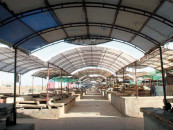Climate concerns
UN report estimated Pakistan’s annual climate change-related economic losses as high as $26 billion a year

Pakistan still has miles to go before it can be considered prepared for inevitable climate change-related events. Even if we are to ignore increasingly intense natural disasters, water scarcity is becoming severer by the day, setting the stage for a major food crisis. There has been little effort to switch away from water-intensive crops. In fact, several political leaders have actually been pushing for expanding domestic production of rice, wheat, sugarcane and cotton without offering up suggestions for where the water will come from. At the same time, food price inflation is also inevitable. Just as the war in Ukraine caused international grain prices to shoot up, recent record wildfires in Europe will also take their toll.
Outside of the food arena, climate change impacts are also causing massive changes in population concentrations — a new KTrade Securities report has noted that after the recent rains in Karachi, people are moving out of posh areas due to its rain sensitivity and moving to suburbs with better drainage. On food, the report stresses the need to widen the focus from raising fertiliser quality and yields to increasing storage capacity to reduce the impact of food price shocks. On the broader economy, however, the report ties everything back to food, noting that food inflation can cause significant political unrest, which in turn affects every sector of the economy and even daily life.
As for the other impacts, a recent UN report estimated Pakistan’s annual climate change-related economic losses as high as $26 billion a year, with fears that losses would increase until concrete action is taken. This makes Pakistan, in economic terms, the most at-risk country in South Asia, and among the most at-risk in the world if we exclude tiny island nations. As many experts have pointed out, slow-walking climate change mitigation efforts keeps the country in a precarious position, which in turn keeps foreign aid flowing, but if we do not build climate resilience soon, there will be nothing left to protect.
Published in The Express Tribune, August 17th, 2022.
Like Opinion & Editorial on Facebook, follow @ETOpEd on Twitter to receive all updates on all our daily pieces.















COMMENTS
Comments are moderated and generally will be posted if they are on-topic and not abusive.
For more information, please see our Comments FAQ